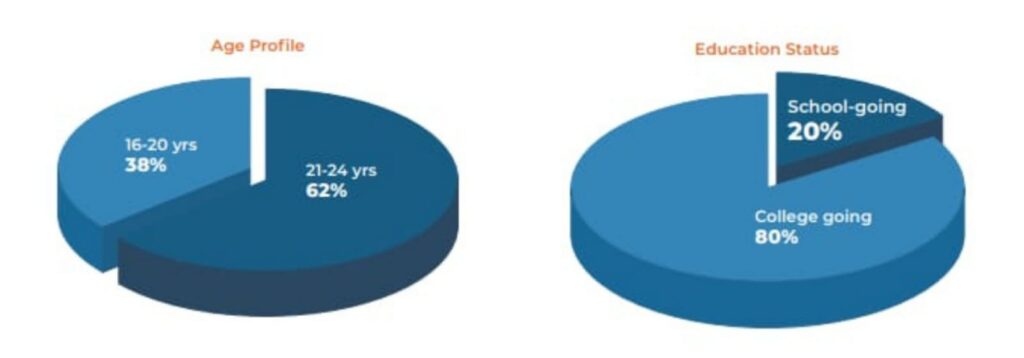Privacy is considered a fundamental right for all, and with our worlds rapidly shifting online, virtual data privacy has become an increasingly pressing issue. A prerequisite for an individual using an app or website is having trust that their personal data will be protected. While many of the leading companies and platforms promise complete confidentiality to the user and are spending millions to protect the personal data of their customers, there are many others who blatantly breach this trust and manipulate their privacy policies for commercial benefit.
Added to that is the fact that our personal information can easily be stolen in several other ways – fraudulent text message or malicious emails, even rogue cookies that are capable of hacking our social media accounts, computers and smartphones. If this data is not kept secure by internet businesses or individuals themselves are unaware of the surreptitious ways their privacy can be breached, it can not only harm reputation, but can also lead to consequences that could be much worse – fraud, theft or personal harm!
Young people have always embodied the spirit of their societies, influencing trends and behavior alike. Consider this: India not only has the world’s largest youth population, Indians-on-internet are also twice the entire population of America. Moreover, with the pandemic confining everyone’s lives to a screen, this dependence has only increased. With nearly one third of India’s 1.4 billion population being on the internet and with over 70% of them being active social media users, I asked some fundamental questions. How much does the Indian youth really bother about privacy of their personal data?
What is the level of awareness and conscious effort towards protection that is being done?
While there is so much talk about data privacy, Gen Z is clearly less angsty. It talks about and looks at privacy in a more balanced manner than other generations or what we hear in media. They are not much concerned that companies will use their personal online data in a way that could harm them.
Why is this so? The Gen Z has grown up in a world of extreme personalization – be their phone, apps, background of laptop or phone, or the Netflix programs they binge upon. Since they demand greater customization and personalization than any generation before, privacy is less of a concern. In fact, most often than not, they do lip service to privacy!
Though few divergent views do exist and we did see traces of mistrust and cynicism in institutions and brand, overall the leaning was towards a healthy balance that fostered personalization and pragmatism. Those who were cautious about privacy expect a lot from brands and when their privacy is breached, they get hurt.
I decided to do some research on this amongst the youth around me. An online survey was conducted amongst 200 respondents in the age band of 16 to 24 years across geographies and that became the basis of this report. The profile of the respondents that we met: 80% college going, 62% in the age band of 20-24 years, equal split of gender. In order to understand the ‘why’ behind some of the responses, I also engaged in conversations with a few opinion leaders and influencers in the same age bracket.

Internet usage can be closely equated to social media usage
With 70% of the 625 mn. Indians on Internet being active users of social media(2), not surprising that “social media” is at the centre of any discussion on internet behaviour. While Facebook is the world’s leading social media platform, amongst the youth surveyed, WhatsApp and Instagram emerged as the top two platforms where most conversations & content exchange is happening.

The new generation is already redefining privacy by creating multiple versions of Instagram, for invitees only which is the Finstagram, and other is a more public facing Instagram. On Instagram, they are happy to engage in ads that interest them. They are not so concerned about sharing phone numbers, and share personal profiles more freely.
How concerned is GenZ about privacy?
On being specifically asked about their level of concern, 76% respondents were not concerned about data privacy. What concerns them to some extent is spying and snooping, information mishandling, cookies, data theft and financial fraud. What gives them comfort s end-to-end encryption policy and credibility associated with large companies.

Is it a case of ‘Convenience’ over ‘Concern’?
Despite so much debate on privacy invasion & data breach, very few stop to consider data privacy when browsing. 60% are quite comfortable in disclosing their name, address, phone number or email address to gain access to a new website that looks interesting, even as a large majority i.e. 84% confirmed that they have never or only very occasionally read the websites Data Privacy & Data Usage terms. 42% never or only once in a while stop to consider data privacy when accessing the internet.

What are the worrying threats?
Malware, Phishing, Ransomware are the buzzwords and mentioned as online threats by most. Cookies on the other hand, is the least worrying online threat.
However one could argue that these are actually less common occurrences in the lives of an average internet user, compared to other more commonly prevailing threats.
- 6 of 10 are not much concerned about using Insecure Networks.
- 1 of 2 are not even aware that their machine IP address or digital footprint tracking can be a threat.
- 1 of 4 do not consider cookies or app downloads as privacy invasion tools.

Have they experienced data breach?
As per some reports, data breach incidents in India were the second highest globally and increasing every year. In our research too, over 60% claimed to have either experienced it themselves or know someone who has experienced some form of breach of privacy.

What personal data would they like to keep most secure?
Passwords are most closely guarded whether these are email or social media passwords. Financial data like bank or credit card details are another important security detail that 94% are concerned about.
Majority seldom hesitate in freely sharing personal information, accepting all cookies or using open networks for privilege of accessing internet services – even on new and unknown websites.

To Sum up
If fossil fuel powered the industrial revolution, personal information is fuelling the exponential growth of businesses in this century. From collecting personal data – whether freely given by the user or surreptitiously extracted when they are browsing , data privacy invasion is on us. Driven by widespread adoption of internet enabled devices, we should give data privacy its due weightage.
Gen Z has a healthy balance of both appreciation and paranoia that comes with sharing data, unlike the millennials who were a lot more casual about sharing or Gen X who are downright fear ridden and don’t adopt easily. Considering youth and their influence on trends and behaviour, business and organizations should design products and build services on trust, transparency and engagement. One of the key questions that still remains is whose job is it to ensure security of users personal information – government’s, or paradoxically the internet companies themselves?

The views expressed in the article are only of the author’s. The author of this article is Shreeya Chandel, pursuing her studies at The Mother’s International School, New Delhi, India.



